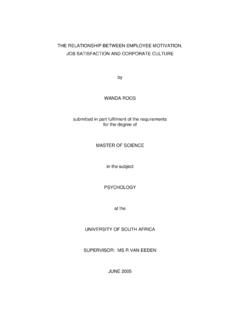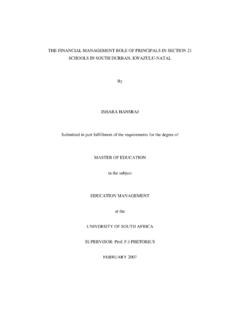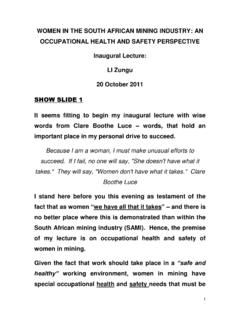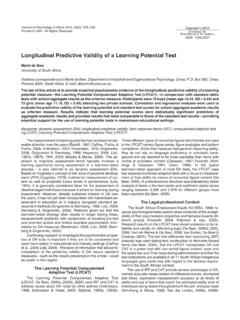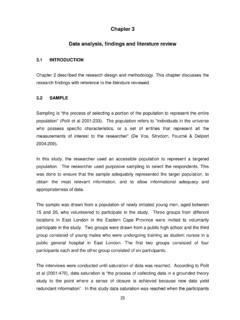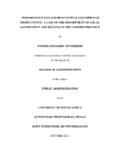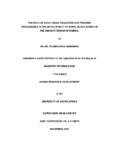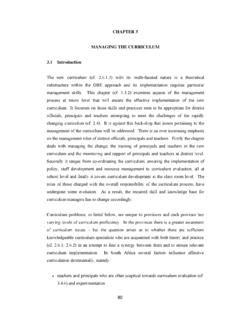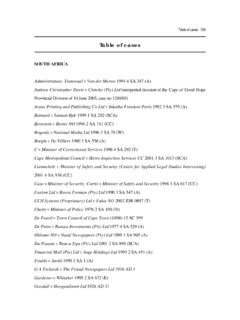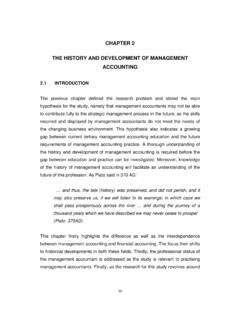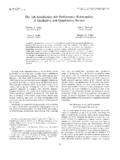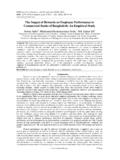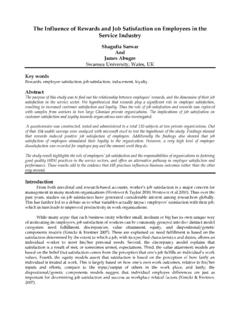Transcription of THE RELATIONSHIP BETWEEN STUDENTS’ ACADEMIC SELF …
1 THE RELATIONSHIP BETWEEN students ACADEMIC self - concept , motivation AND ACADEMIC achievement AT THE UNIVERSITY OF THE FREE STATE by LOUISE ROLENE COETZEE Submitted in accordance with the requirements for the degree of MASTER OF EDUCATION WITH SPECIALISATION IN ADULT EDUCATION at the UNIVERSITY OF SOUTH AFRICA SUPERVISOR: Dr Geesje van den Berg J une 2011 2 ACKNOWLEDGEMENTS I would like to thank Dr Geesje van den Berg, for guiding me and supporting me in my goal to finish this dissertation. I would like to thank Professor Karel Esterhuyse, for helping me with the statistical analysis of this study. I would like to thank Professor Keren Le Roux, for the editing of this dissertation.
2 I would like to thank Professor Basie Verster, for allowing me to conduct my empirical investigation at the Department of Quantity Surveying at the University of the Free State. Without his permission, this study would never have been possible. Last but by no means least I would like to thank my mom, for helping me with all my data collection, and for supporting me when the going got tough! It would not have been possible without your unfailing love. 3 DEDICATION This work is dedicated to my kind and wonderful husband, Rudi Coetzee, who never, even for a moment, stopped supporting me.
3 Your unconditional love and devotion to me is what gives me strength and hope. La vie nous a enseign que l'amour ne consiste pas en regardant fixement l'un l'autre mais en regardant l'ext rieur ensemble en m me direction. Life has taught us that love does not consist of gazing at each other but in looking outward together in the same direction. Antoine de Saint-Exup ry 4 5 THE RELATIONS HIP BETWEEN S TUDENTS AC ADEMIC S ELF- concept , motivation AND ACADEMIC achievement AT THE UNIVERS ITY OF THE FREE STATE by LOUISE ROLENE COETZEE SUPERVISOR: DR G VAN DEN BERG DEPARTMENT: EDUCATIONAL STUDIES DEGREE: (With Specialisation in Adult Education) The purpose of this study was to investigate the RELATIONSHIP that exists BETWEEN ACADEMIC self - concept , motivation and ACADEMIC achievement at the University of the Free State.
4 The primary aim of this study was to determine if ACADEMIC self - concept and motivation of quantity surveying students at the University of the Free State could predict their level of ACADEMIC achievement . The sample was selected by means of convenience sampling. Relevant literature indicated that there are contrasting findings about whether a RELATIONSHIP exists BETWEEN students ACADEMIC self -concepts and motivation , and ACADEMIC achievement . The empirical investigation revealed that there are only significant correlations BETWEEN ACADEMIC self - concept , motivation and ACADEMIC achievement in some of the study year levels and not in all of them.
5 Ke y te rm s : self - concept ACADEMIC self - concept motivation Intrinsic motivation Extrinsic motivation Amotivation ACADEMIC achievement students / learners Lecturers / teachers / educators 6 TABLE OF CONTENTS CHAPTER ONE INTRODUCTION AND OVERVIEW Page Introduction 13 Research problem 15 Aims of the research 18 Theoretical framework 18 ACADEMIC self - concept 19 motivation 20 ACADEMIC achievement 22 Research design and method 22 Research design 22 Sample 23 Data collection methods and data processing 23 Ethical considerations 24 A definition of the terms, within the context of this study 24 self - concept 24 ACADEMIC self - concept 25 motivation 25 Intrinsic motivation 25 Extrinsic motivation 26 Amotivation 26 ACADEMIC achievement 26 students / learners 27 Lecturers / teachers / educators 27 Division of chapters 27 Conclusion 28 7 CHAP TER TWO THE ROLE OF AC ADE MIC S E LF-C O NC E P T AND MO TIVATIO N IN AC ADE MIC achievement Page Introduction 29 ACADEMIC self - concept 31 Contextualization 31 The structure of self - concept 32 The role of ACADEMIC self - concept in ACADEMIC achievement 36 The influence of a positive and a negative ACADEMIC self - concept on ACADEMIC achievement
6 39 A humble or realistic self - concept and ACADEMIC achievement 41 The RELATIONSHIP BETWEEN ACADEMIC self - concept and ACADEMIC achievement 43 motivation 46 Background 46 The self -determination theory 49 Intrinsic and extrinsic motivation and amotivation 50 Intrinsic motivation 50 Extrinsic motivation 53 Amotivation 55 The RELATIONSHIP BETWEEN intrinsic and extrinsic motivation and ACADEMIC achievement 57 ACADEMIC achievement 60 The RELATIONSHIP BETWEEN ACADEMIC self - concept , motivation and ACADEMIC achievement 61 Summary 64 8 CHAPTER THREE THE RES EARCH METHODOLOGY Page Introduction 66 The research problem and research questions 66 The research aims 67 The hypotheses 68 Research design and method 69 Introduction 69 Quantitative research design 70 The research sample 71 The questionnaire 73 Measurement instruments 74 ACADEMIC self - concept 74 motivation 76 ACADEMIC achievement 77 The validity and the reliability of the data gathering methods 78 Introduction 78 The measurement of ACADEMIC self - concept and of motivation 79 Content validity and face validity 79 Construct validity 80 Reliability
7 81 Procedure for administering the questionnaires 83 Statistical techniques for the analysis of the data 84 Introduction 84 The Pearson Product Moment correlation 84 Hierarchical regression 85 The Mann Whitney U-test 85 Level of statistical significance 85 9 Ethical considerations 86 Introduction 86 Informed consent 86 Violation of confidentiality 87 Release or publication of the findings 88 Summary 88 10 CHAPTER FOUR THE FINDINGS AND A DIS CUS S ION OF THE FINDINGS Page Introduction 89 Collection of the data 89 Measurement instruments 90 ACADEMIC self - concept 90 motivation 92 ACADEMIC achievement 93 Research hypotheses 93 Statistical procedures 94 Results and a discussion of the results of hypothesis 1 95 Results and a discussion of the results of hypothesis 2 102 Conclusion 106 11 CHAPTER FIVE CONCLUS IONS.
8 RECOMMENDATIONS AND LIMITATIONS OF THE S TUDY Page Introduction 110 Summary of the study 111 Findings in respect of the RELATIONSHIP BETWEEN ACADEMIC self - concept and ACADEMIC achievement 111 Literature review 111 Empirical investigation 112 Summary of the findings of the RELATIONSHIP BETWEEN ACADEMIC self - concept and ACADEMIC achievement 113 Findings in respect of the RELATIONSHIP BETWEEN motivation and ACADEMIC achievement 115 Literature review 115 Empirical investigation 116 Summary of the findings of the RELATIONSHIP BETWEEN motivation and ACADEMIC achievement 117 Conclusions of the study 119 Introduction 119 Hypothesis 1 119 Hypothesis 2 121 Main research question 122 Recommendations 123 Limitations of the study 125 Summary 126 12 AP P ENDICES Page A Student ACADEMIC self - concept and motivation questionnaires 140 B Letter of permission 147 TAB LE S Page Table 1 Alpha-coefficients for the questionnaire sub-scales 82 Table 2 The distribution of students across the four study years 90 Table 3 Correlations BETWEEN the predictor variables and the criterion variable for the four study years 96 Table 4 An explanation of variance by a complete model per study year group 98 Table 5 The contribution of the different variables to the R for the second year students 99
9 Table 6 The contribution of the different variables to the R for the third year students 101 Table 7 A comparison of the above average and below average first year ACADEMIC achievers averages on the seven sub-scales 103 Table 8 A comparison of the above average and below average second year ACADEMIC achievers averages on the seven sub-scales 103 Table 9 A comparison of the above average and below average third year ACADEMIC achievers averages on the seven sub-scales 105 Table 10 A comparison of the above average and below average fourth year ACADEMIC achievers averages on the seven sub-scales 105 13 CHAPTER 1 INTRODUCTION AND OVERVIEW INTRODUCTION ACADEMIC achievement is an important factor in national education because it can be seen as an indicator of whether the education in a country is successful or not.
10 Dambudzo (2009:1) states that over the past couple of decades society has placed infinitely more emphasis on the ACADEMIC achievement of its citizens. The ACADEMIC achievement of students is an important indicator of ACADEMIC success at university level. students with higher levels of achievement at university are more likely to obtain good employment and salaries. Test scores predict success in the job market in terms of higher wages (Joppke & Morawska 2003). In short, ACADEMIC achievement is important because it promotes success later in life (Areepattamannil & Freeman 2008:703) and in current life. Large numbers of students start university every year with different marks obtained at Grade 12 level.
